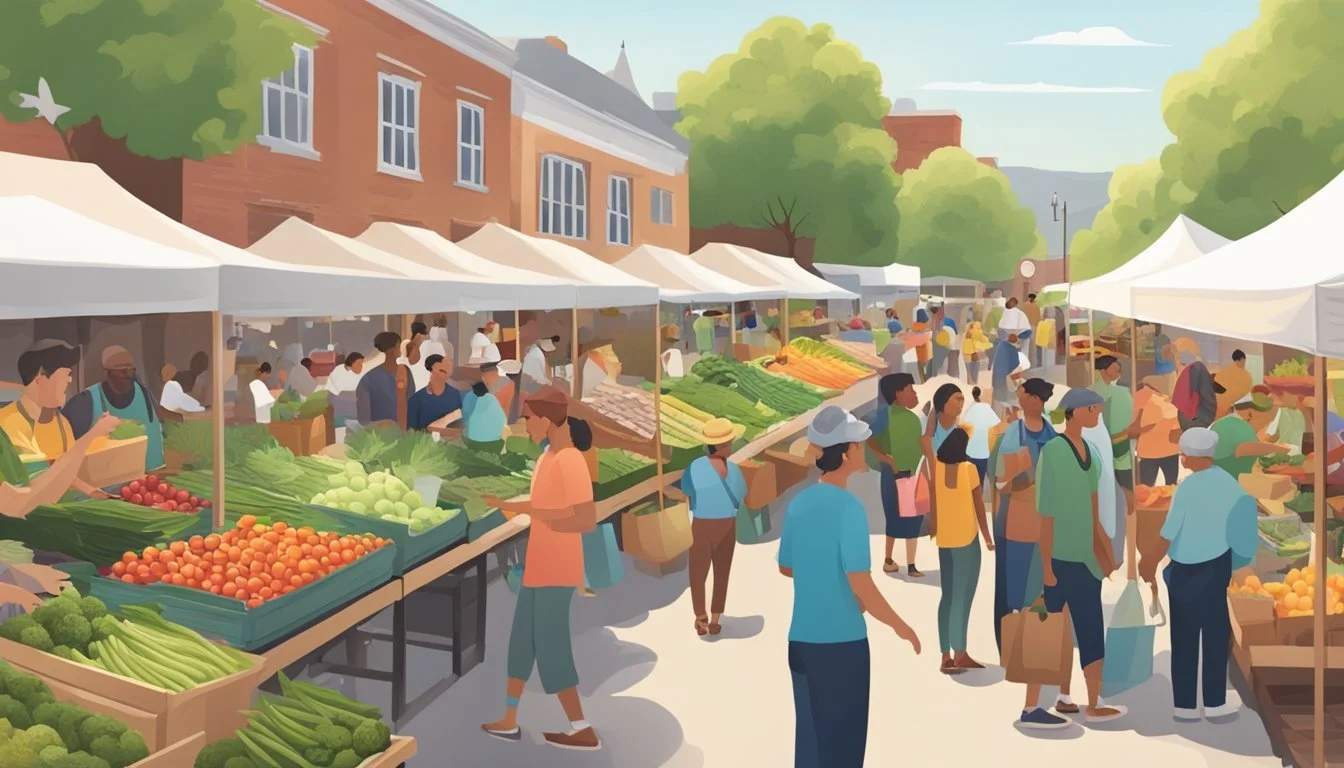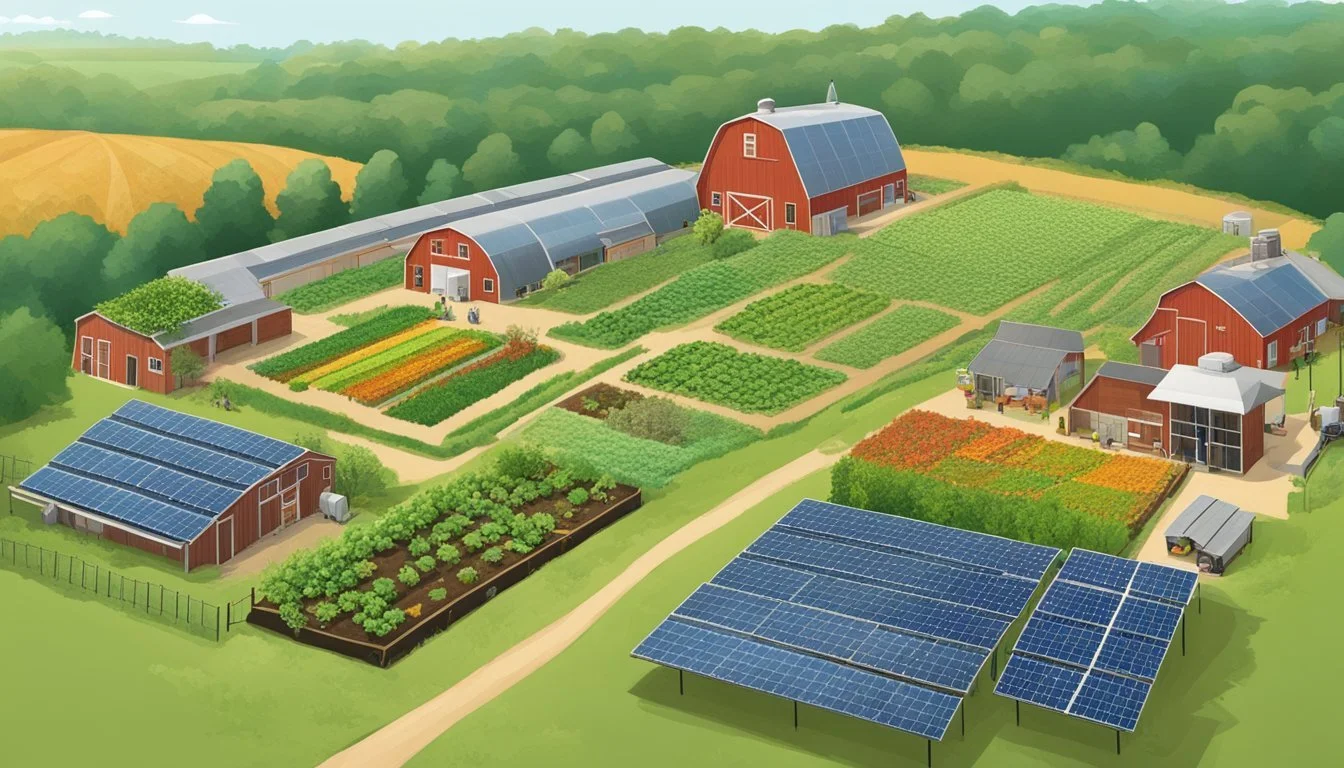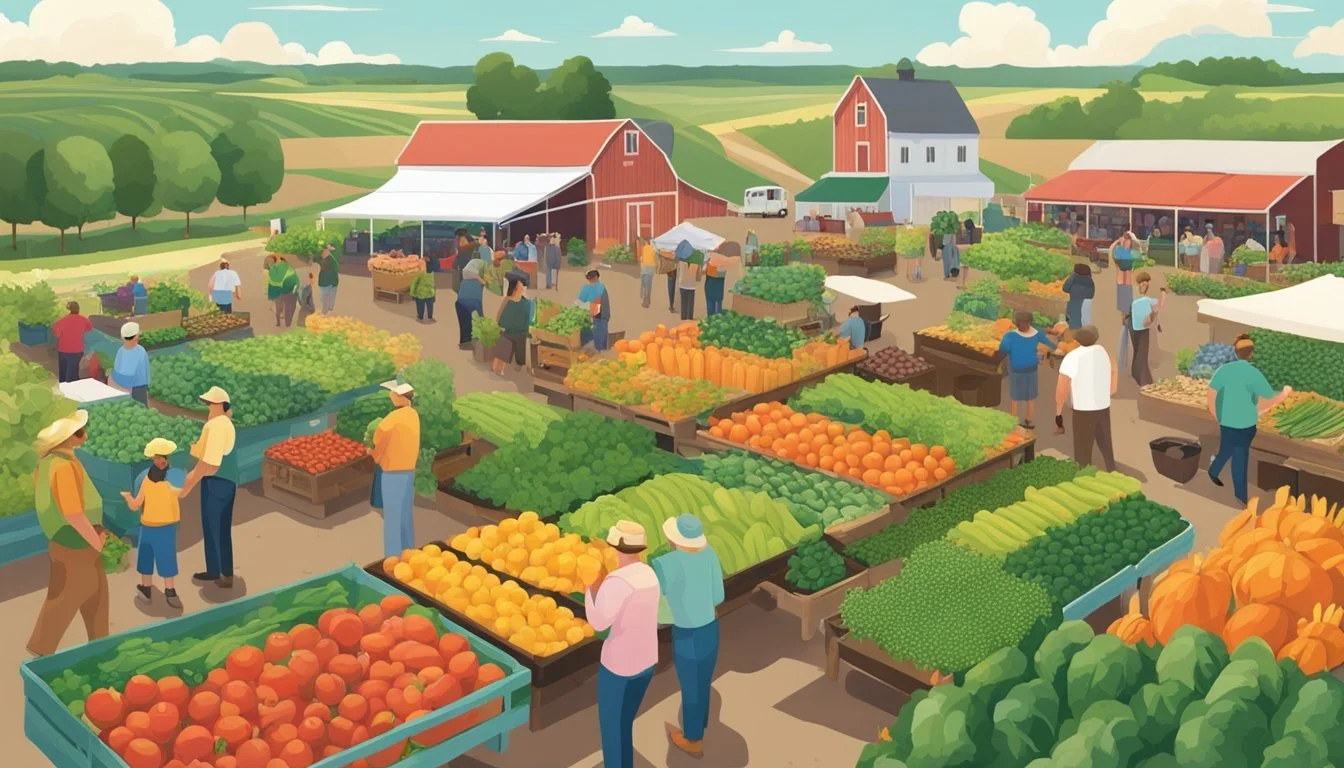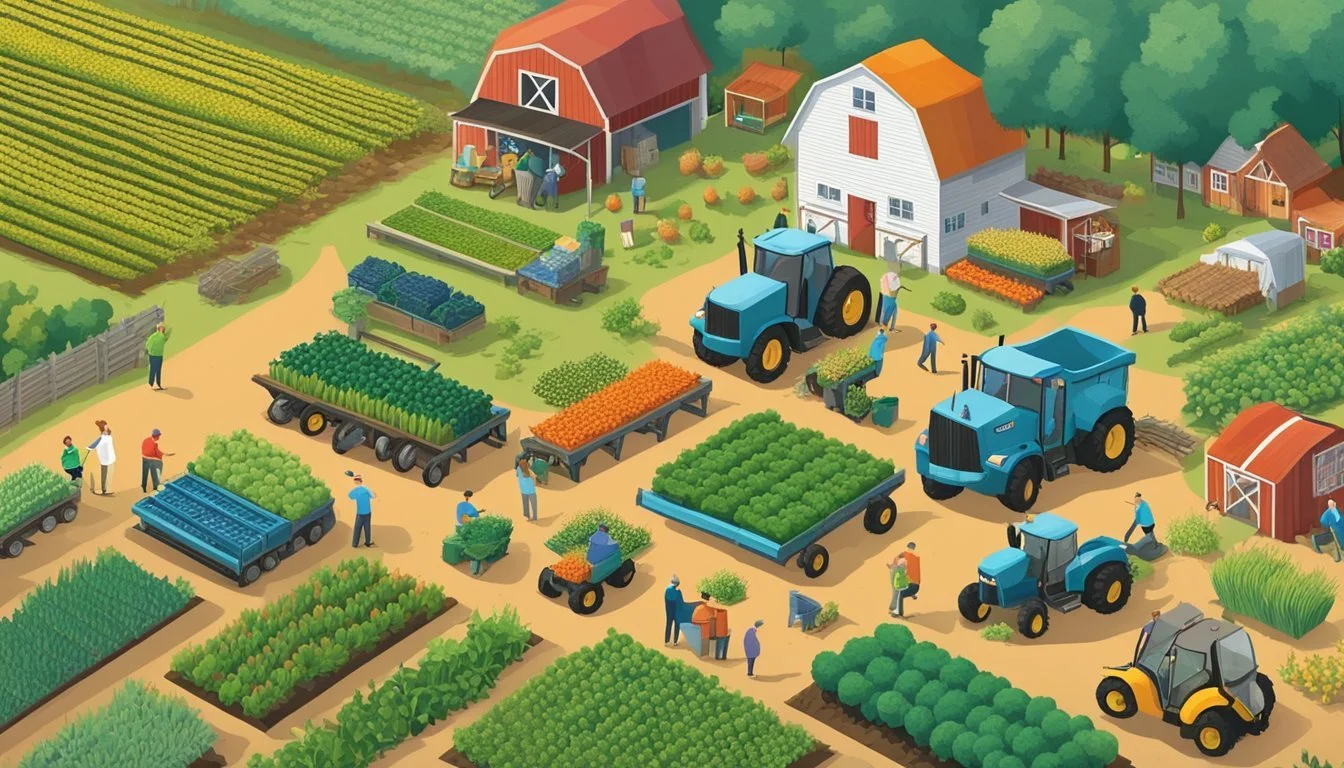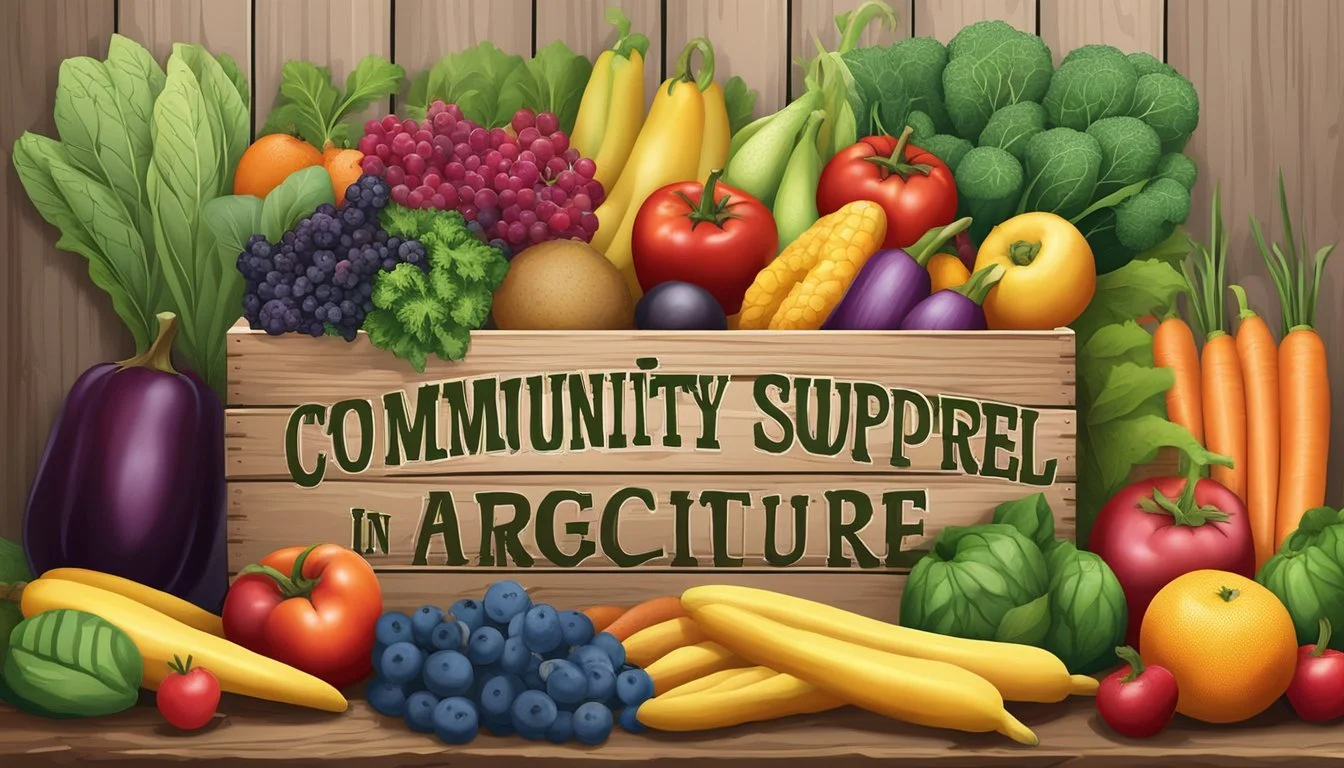Community Supported Agriculture in Davenport, IA
Thriving Local Food Networks
Community Supported Agriculture, commonly known as CSA, is a popular model of food production and distribution that directly connects farmers and consumers. In Davenport, Iowa, this agricultural approach has taken root, offering residents the opportunity to engage in a system that promotes local economic stability and provides access to fresh, seasonal produce. Subscribers to a CSA program in Davenport typically commit to a season of produce from local farms, which in turn allows farmers to anticipate demand and plan their crops accordingly.
This symbiotic relationship underpins the CSA model, allowing consumers to support local agriculture while enjoying the benefits of high-quality, farm-fresh food. As an integral part of the city's commitment to sustainable living and community health, Davenport's CSA farms offer a variety of organic vegetables, herbs, fruits, and sometimes additional products like eggs or flowers. Each week during the growing season, which usually spans from May to October, subscribers receive a share of the farm's harvest, fostering a direct link between the food they eat and the land it comes from.
Davenport's participation in CSA programs showcases a dedication to fostering environmental stewardship and strengthening the local food system. By choosing to partake in a CSA, residents of Davenport not only gain access to nutritious, locally-grown produce but also contribute to the preservation of small farms and the promotion of biodiversity within their community. This engagement with local agriculture exemplifies a broader movement towards sustainable consumption and showcases a collective effort to support and revitalize local farming practices.
Understanding CSA
Community Supported Agriculture (CSA) represents a model where both producers and consumers share in the bounty and risks of food production. This system facilitates local food distribution that emphasizes community, seasonal produce, and sustainable farming practices.
Basic Concepts of CSA
In its essence, a CSA is a partnership between local farmers and consumers. Consumers purchase shares or subscriptions to a farm's harvest in advance of the growing season. These subscriptions help fund the upfront costs of the farm's operation. In return, shareholders receive a regular distribution of fresh produce, usually on a weekly basis. This model reinforces the link between community supported agriculture and local consumers, fostering a direct understanding of where and how their food is grown.
Benefits of Joining a CSA
The advantages of joining a CSA are manifold. Members enjoy fresh, local, and often organic produce, which supports the health of individuals and the environment. Additionally, CSAs can contribute to community events and education, deepening the connection between consumers and their food. By participating in a CSA, members are:
Directly supporting local and sustainable farming
Experiencing the variety of seasonal products
Often able to visit the farms and meet the growers
Potential Risks and Considerations
While joining a CSA offers several benefits, it also comes with inherent risks. Since shareholders share in the farm's yields, a poor harvest due to weather or pests can mean a smaller share of produce. Consumers should consider:
The variability of produce quantity and variety
The need for flexibility and creativity in meal planning due to the unpredictability of seasonal harvests
CSA Models and Structures
CSAs can vary widely in their structure. The traditional CSA model involves a weekly pickup of vegetables and fruits, but innovations in the CSA format now include options for meat, dairy, and artisanal products. The CSA Innovation Network has spurred developments in CSA models. Structures include:
Market-style pickups, allowing members to choose produce
CSAs that offer additional subscriptions for items like eggs or cheese
Farms that integrate community events and educational programs
By understanding the basic principles, benefits, risks, and the diverse structures of CSA models, consumers can make informed decisions about participating in their local food economy and contribute to the sustainability of their community.
Local CSA Farms in Davenport
In Davenport, community-supported agriculture is alive and well, with a range of farms like Small Frye Farm and Quad Cities Food Hub offering fresh, organic produce and other farm products directly to residents.
Profiles of Notable CSAs
Small Frye Farm is recognized for its dedication to organic practices, providing members with organic heirloom vegetables, herbs, and fresh flowers. Their CSA has a presence both at the farm in Maysville and in Iowa City.
Quad Cities Food Hub operates not just as a CSA but also as a co-op, bringing an assortment of local produce to the Davenport community and feeding into the educational and sustainable ethos of the CSA movement.
Range of Produce Offered
CSAs in Davenport offer a rich variety:
Vegetables: A wide spectrum of seasonal and organic vegetables.
Fruits: Including rare heirloom varieties.
Herbs: Fresh and aromatic herbs for culinary uses.
Flowers: Beautiful blooms that bring joy and color.
Specialty Items and Farm Products
Beyond the standard CSA offerings, Davenport's local farms provide a variety of specialty items:
Eggs: Options include farm fresh eggs, duck eggs, and eggs from pastured chickens.
Meat: Some farms offer meats from animals raised in pastured environments.
Honey and Cheese: Local sweeteners and dairy products are available from select farms.
These Davenport farms are not just food suppliers; they are integral parts of the community, promoting healthy eating and sustainable farming through their direct engagement with CSA members.
Supporting Local Economy
Community Supported Agriculture (CSA) in Davenport, IA, underpins the local economy by connecting consumers with locally grown produce. This model empowers consumers to invest directly in local farmers, effectively stabilizing the agricultural segment of the economy. A CSA share purchased by Davenport residents translates into advanced capital for farmers to cover the initial costs of the growing season.
Residents who partake in CSAs help sustain the economic vitality of the Davenport farmers market. Local producers benefit from a guaranteed market for their goods, which in turn encourages them to continue and possibly expand their farming operations. This fosters a vibrant local agricultural sector and reduces the uncertainty often associated with farming.
By prioritizing CSA, the community contributes to creating a robust market for locally grown products, reducing the need for extensive food transportation. This not only supports Davenport’s economy but also promotes sustainable environmental practices.
Here are key points highlighting CSA's impact on the local economy:
Predictable Revenue: Farmers receive upfront payment, allowing for financial planning and investment in quality farming practices.
Local Spending: Money spent on CSAs stays within the community, bolstering other businesses and services in the area.
Job Creation: Prosperous farms are likely to hire more workers, thereby increasing local employment opportunities.
Market Stability: CSAs provide farmers with a consistent customer base, mitigating the risks of fluctuating market prices.
Engagement in CSA initiatives serves as a tangible declaration of support for Davenport’s local producers and the broader economy, ensuring that the communal ties between producer and consumer remain strong and mutually beneficial.
Environmental Impact and Sustainability
Community Supported Agriculture (CSA) in Davenport, IA, emphasizes environmental stewardship through the adoption of sustainable and organic farming practices. Sustainable farming serves as the backbone of CSAs, which operate on principles meant to conserve resources and foster ecological balance.
Organic farming methods are widely embraced by CSAs, abstaining from synthetic pesticides and fertilizers. This approach not only protects the local ecosystem and biodiversity but also ensures that consumers receive food free from chemical residues. By nurturing the soil with organic matter and utilizing natural pest control, CSAs help sustain the land's productivity for future generations.
CSAs also strategically combat food waste by fostering local consumption. Since food is distributed directly from farm to table, the long supply chains responsible for significant food spoilage are shortened. Members receive fresh produce in quantities reflecting their consumption, thus minimizing excess and reducing food sent to landfills.
Lastly, the environmental footprint of the agricultural sector is reduced through CSA models. As members typically live nearby, the overall carbon emissions associated with transportation of goods are notably decreased.
Key Practices Description Organic Farming Avoidance of chemical pesticides, fostering soil health Reducing Food Waste Direct distribution, tailored to community needs Local Consumption Lower transportation emissions, fresh seasonal produce
In conclusion, the Community Supported Agriculture model in Davenport, IA, offers a robust framework for addressing environmental concerns, showcasing how local collective action can have a tangible impact on promoting sustainability in agriculture.
Consumer Participation and Education
Community Supported Agriculture (CSA) in Davenport engages members through a symbiotic relationship where both consumer education and participation are pivotal. Membership in a CSA often requires active engagement, allowing individuals to gain a deeper understanding of sustainable practices and the value of locally sourced food.
Education is a cornerstone of a successful CSA, as informed members are typically more invested in the CSA's success. The Leopold Center for Sustainable Agriculture has emphasized the importance of community education as it pertains to agricultural sustainability. Their initiatives underline the significance of bringing together community members and local farmers to foster learning and appreciation for farm stewardship.
In Davenport, CSA programs have often focused on the following:
Building Relationships: Fostering connections between farmers and community members through farm visits, newsletters, and community events.
Promoting Involvement: Encouraging members to participate in decision-making processes, voicing their opinions on crop selections, and sharing risks and rewards.
Providing Hands-On Learning: Offering workshops and farm days for members to experience farming firsthand, learning about organic farming practices and crop rotations.
The community's role is also influential in the education process, creating a demand for learning opportunities on topics such as:
Environmental impacts of food production
The economics of the local food system
By cultivating a membership that is both knowledgeable and actively involved, CSAs in Davenport are creating resilient, well-informed communities that are invested in the vitality of their local food systems.
Starting and Managing a CSA
When farmers in Davenport, IA consider launching a Community Supported Agriculture (CSA) operation, methodical planning is crucial. CSA farms function on a prepaid subscription basis, where members pay for a season's worth of produce upfront. This model provides farmers with a stable income and mitigates some of the risks associated with farming.
Annual Planning: Before the season begins, farmers must calculate the number of shares they can support, factoring in crop yield and labor resources. It's recommended to start small to ensure manageable growth. Connecting with organizations such as LocalHarvest can help farmers reach interested community members.
Administration: Efficient management involves setting up a payment structure for CSA members, which can be a lump sum or installments. Farmers should also have a system to communicate with their members, often through newsletters or social media platforms.
Steps for Management Description Crop Selection Choose a variety of crops that can sustain the members throughout the season. Membership Allocation Determine how many shares can be provided while maintaining crop quality. Payment Handling Set up a prepayment system for members to support the farm's financial planning. Communication Regular updates about crop status and share contents foster community engagement.
In Davenport, local farmers have the advantage of rich soil, a growing season conducive to a wide variety of crops, and a community inclined to support local agriculture. Starting a CSA requires a blend of agricultural acumen and business savvy, with an emphasis on creating a symbiotic relationship between farmer and consumer.
Innovations in CSA
Community Supported Agriculture in Davenport, Iowa, is teeming with ingenuity, embracing online platforms for marketing and sales, fostering community spirit through events, and adopting new farming techniques for enhanced sustainability.
Online Marketing and Sales
CSAs in Davenport increasingly leverage online ordering systems to streamline the distribution of fresh produce to their members. This includes dedicated websites with weekly sales and real-time inventory updates, allowing members to customize their share based on availability. Online marketing strategies implemented through social media are connecting local farmers with a broader audience, improving community engagement and outreach.
Community Outreach and Events
Davenport's CSAs are strengthening their sense of community by organizing events that serve both as educational experiences and marketing opportunities. Farm-to-table dinners, cooking classes, and harvest festivals allow members to connect with their food and farmers. These events are meticulously advertised online and enhance the community events calendar, integrating the principles of organic farming with local culture.
New Farming Techniques
Farmers are integrating innovations in their farming practices, incorporating techniques that prioritize soil health and ecological balance. This includes a shift towards organic farming practices that emphasize the use of natural fertilizers and pest management. Techniques such as crop rotation, cover cropping, and reduced tillage are contributing to a more sustainable agriculture approach while maintaining a high-quality crop yield.
Legal and Financial Considerations
Community Supported Agriculture (CSA) in Davenport, Iowa operates within a structured legal and financial framework. Legal agreements are core to establishing a CSA's operation. These written contracts typically outline terms such as membership fees, delivery schedules, and liability.
Financial planning is crucial, as CSA models rely on upfront consumer payments to fund initial production costs. This capital infusion supports the farm early in the season but also means farmers must manage a budget that encompasses the entire growing cycle.
When establishing a CSA, one must choose an appropriate business entity. Options include:
Sole proprietorship
Partnership
Corporation
Cooperative
Each entity comes with its own management structure, liability considerations, tax implications, and regulatory obligations. For instance, corporations might offer limited personal liability but incur more complex filing requirements.
The U.S. Department of Agriculture (USDA) collects data on CSAs and may provide guidelines for best practices. CSA farms must also adhere to local regulations in Davenport, including those related to zoning, health and safety standards, and employment law.
It’s essential for CSA organizers to understand both state and federal tax requirements, which will vary depending on the chosen business structure. Proper financial planning and adherence to legal regulations are critical for the sustainable operation and growth of CSA farms.
Challenges and Future of CSA
Community Supported Agriculture (CSA) in Davenport faces challenges that are common in the broader context of CSA systems. Scaling up, for instance, is a significant hurdle as CSAs aim to satisfy growing consumer demand while maintaining their values of ecological responsibility and community engagement. A balance must be struck between expanding operations and preserving the intimate connection between consumers and their food sources.
Another challenge comes in the form of logistical complexities, such as the distribution of fresh produce. Efficiently coordinating CSA deliveries to a broadening customer base without compromising product quality requires innovative solutions.
Inclusivity is also a concern, as CSAs must remain accessible to diverse populations. Ensuring affordability and reaching out to various communities demands thoughtful strategies and often, policy support.
Looking to the future, trends suggest that CSA in Davenport may leverage technology to address some of these challenges. Digital platforms could enhance the CSA model by streamlining distribution and payment processes, thereby improving accessibility.
The growth of the CSA model is likely to continue, driven by consumers seeking food transparency and a connection with local farmers. With this, agriculture is transitioning toward models that prioritize community and environmental health.
Projected Future Trends:
Expansion of CSA models to include more diverse products beyond produce
Partnerships with local businesses and schools to increase CSA reach
Technology integration to bolster CSA management and customer engagement
Addressing the challenges and embracing the trends are vital for the sustainable growth of CSA in Davenport, ensuring it remains a viable model that contributes positively to both the community and the environment.
Conclusions and Tips for Consumers
Community Supported Agriculture (CSA) programs offer consumers in Davenport, IA, a chance to partake in local food economies, ensuring access to fresh produce while supporting nearby farmers. For those interested, here are several tips to maximize the CSA experience:
Evaluate the Subscription
Before committing to a CSA, consumers should assess:
Cost: Ensure it fits within your budget.
Produce variety: Does it align with your dietary preferences and cooking habits?
Be Prepared for Seasonal Eating
CSA shares often reflect the season's harvest. Consumers might anticipate:
Abundance of certain crops
A learning curve preparing unfamiliar vegetables
Ask Questions
Inquiring about:
Farming practices
Share sizes
Pickup logistics
can clarify expectations.
Understand the Commitment
Joining a CSA means sharing the risks and benefits with your farmer. Weather and other factors may affect harvests.
Make the Most of Your Share
Consumers should:
Properly store different types of produce to extend freshness
Connect with Your Community
CSAs often foster community through:
Farm events
Newsletters
Social media groups
Engaging can enhance the CSA experience.
Final Thoughts for Consumers
Remember, CSAs represent a symbiotic relationship between farmers and consumers, rooted in trust and support. By following these tips, individuals can confidently navigate their subscriptions, contribute to the local food system, and enjoy the myriad benefits of community-supported agriculture.



